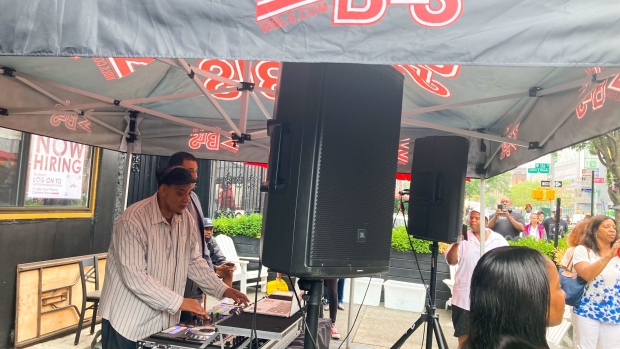Aug 2, 2022
Soul Food Staple Sylvia’s Celebrates Its 60th Anniversary in Style
, Bloomberg News

(Bloomberg) -- Monday felt like a Sunday at Sylvia’s. The legendary soul food restaurant in New York City’s Harlem neighborhood celebrated 60 years in business on Aug. 1.
The party began at 8 a.m. DJ Red Alert, a seminal figure in hip-hop music, played records of classic songs by Stevie Wonder and Aretha Franklin as people danced outside despite the rain. Mayor Eric Adams was in attendance as well, joining diners who were dressed in their most elegant hats and fabulously fitting clothes.
“It’s tradition to do a community breakfast every anniversary,” said Sean Woods, chief executive officer of Sylvia Woods Inc. and a grandson of the namesake restaurateur. “It was her second-favorite day to Christmas.”
The soul food eatery fared better than many other restaurants in the city during the pandemic, which caused as many as 1,000 New York City establishments to close. Part of Sylvia’s survival came from a strong foundation and a pivot in the business to partially rely on retail products to replace income from in-restaurant dining.
Being a decades-old institution helped, too. The experience of eating at Sylvia’s is etched in the memory of generations of visitors and kept the community rallying and delighting in its food.
“Everybody talked about gospel brunch at Sylvia’s [during the ‘90s],” said public-relations director and native New Yorker Steven Hall. “They would have this brunch where they would have a Sunday gospel experience. That was like a rite of passage.”
Sylvia Woods and her childhood-sweetheart-turned-husband moved to Harlem from South Carolina in the 1950s. After working at a luncheonette for several years, she bought the restaurant from the owner and began to expand what has become a gravitational center of the neighborhood near 125th Street and Malcolm X Boulevard.
It officially opened in 1962 and has since blossomed into a family business including a full-service catering hall, a nationwide line of products from Sylvia’s Soul Food Brand, a real estate holding company, a scholarship program, and more.
“Many restaurants go out of business within five years,” Hall continued. “But to last 60 years, it’s more than a milestone. It shows perseverance, and it shows dedication. It shows the dedication to your customers and the quality. And the fact that you’re there through economic downturns, pandemics—through so many other things that are thrown at you.”
For a Black-owned restaurant in the US, it’s a milestone that’s even more significant.
The menu is classic soul food: Mac and cheese that stretches apart with a layer of cheddar baked on top, collard greens oozing with flavor, corn muffins balancing textures between a crunchy outside and a soft interior, and yams swimming in a tangerine-colored pool of their own sweetness.
Although Sylvia passed away in 2012, front-of-house manager and granddaughter Zaqura Frierson said Sylvia’s spirit and essence live on in the restaurant. “She always said, ‘Keep cooking with love,’” Frierson said.
Her grandchildren said she would wake up, shower, and quickly do her routine. With her voluminous side-swept hair, square-frame glasses, and red lips—what became one of her classic looks—Sylvia would make her way to the restaurant.
Everyone who came to Sylvia’s when she was alive has a story with her, even if it was a simple interaction, Woods said. “She had that touch, you know.” From the crimson walls decorated with framed pictures of Barack Obama and Muhammad Ali to the scent of the food, Sylvia’s warmth remains evident.
The restaurateur’s grandchildren plan to expand the business while keeping loyal to the essence that’s rooted in Sylvia’s “true Southern hospitality.”
“She would be very happy just looking outside and seeing people lining up, waiting to be fed, and being excited,” Woods said. “She would be humbled by it, because that’s just who she was. She was literally thankful for anybody who wanted to show love. And that’s why she gave so much of it out.”
©2022 Bloomberg L.P.


